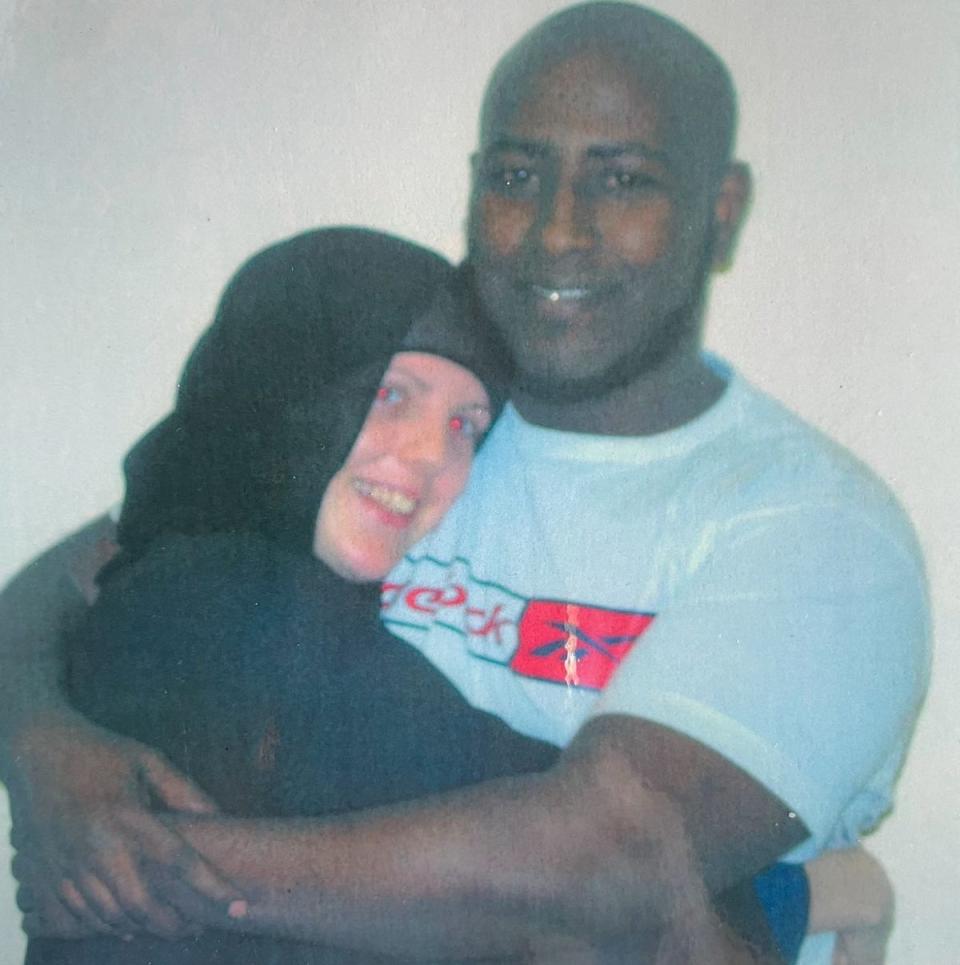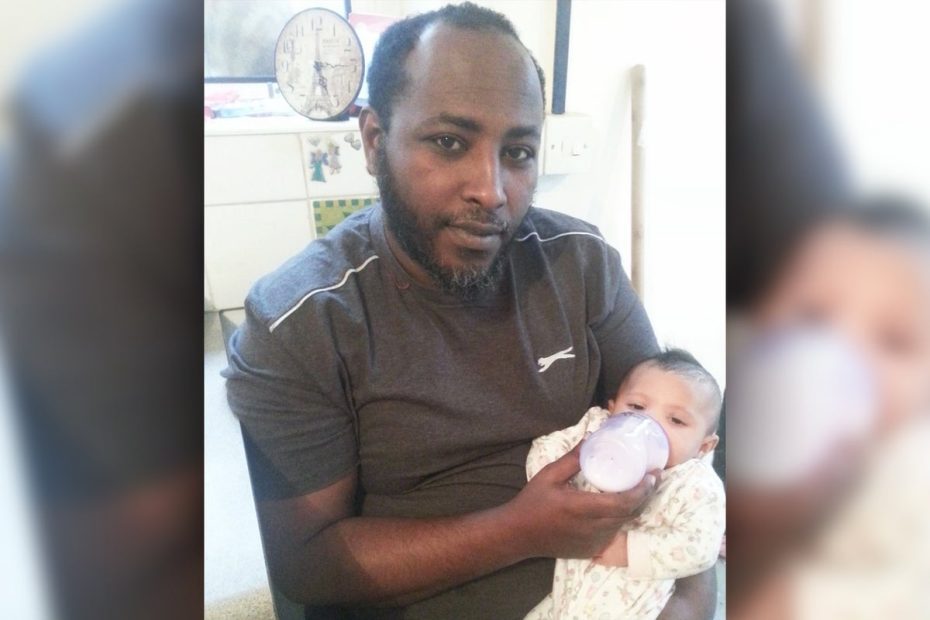A father jailed indefinitely for a laptop theft nearly 20 years ago still has no release date after being recalled to prison for missing a hospital appointment.
Abdullahi Suleman's distraught wife, Bernadette Emerson, has accused the prison system of “exploiting” his mental health to keep him locked up under the abolished Imprisonment for Public Protection (IPP) sentence.
The 41-year-old, who has been diagnosed with bipolar disorder and post-traumatic stress disorder, was sentenced to a minimum of three years and 276 days for a robbery at the age of 22.
But 19 years later, he remains in prison despite committing no further crimes. He has been returned to prison four times after mental health visits became part of his licence conditions.
In total, he has spent nearly 15 of the last 19 years in custody and is now back in jail with little hope of release.
His case was branded “scandalous” by former Justice Committee chairman Sir Bob Neill, who said it was a clear example of the “vicious circle” of deteriorating mental health that many IPP prisoners experience.
Sir Bob urged the new government to have the courage to follow the commission's recommendation and re-sentence the nearly 3,000 prisoners still serving their sentences. He warned: “It has to happen now.”


Mrs Emerson insisted her husband should receive “treatment not punishment” as she demanded immediate help for IPP prisoners.
The 39-year-old said The independent: “It’s really wrong. They’re violating his human rights. They’re exploiting his illness.”
The IPP prison sentences – which gave offenders a minimum but no maximum – were abolished in 2012 due to human rights concerns. But the abolition of the policy had no impact on those already sentenced, leaving thousands in prison for years longer than their original terms.
According to the latest figures published this week, 2,734 people are still in prison under the abolished sentence – just six percent fewer than last year. An estimated 700 people have been in prison for at least 10 years longer than their minimum tariff.
Suleman, a qualified bricklayer and plasterer who fled the conflict in Somalia as a child for a better life in Britain, was given an IPP (Institutional Criminal Charge) in 2005 for the theft of a laptop in a Cardiff park.
He served six years before being released, but was recalled two and a half years later after his mental health problems relapsed in the community.
Doctors gave him a treatment plan, which was then added to his strict licensing conditions. So when he missed a hospital appointment, he was called back to prison – despite having committed no further crimes.
In the years that followed, he was recalled three more times, each time linked to “mental health non-compliance,” his wife said, adding that his detention had now become “arbitrary.”
Mrs Emerson, from Cardiff, said each recall tears the family apart, leaving her to raise her three daughters, aged nine, 10 and 19, on her own.
He was last re-imprisoned in 2017 and has since spent almost seven years in prison without release, while his mental health continues to deteriorate.
“It really affected him psychologically,” said Mrs. Emerson. “He always describes only immense psychological torture. I feel like it has stopped his life. It has stopped him from moving on from the sentence and starting his life.
“It affected every aspect. It affected his fatherhood.
“I think it's just painful for him that he lost so many of his adult years to the punishment.”
Mrs Emerson's concerns about her husband's condition were heightened recently when she had no contact with him for almost a month. She said a lawyer had told her he had been stabbed at the scandal-hit Category B prison HMP Swaleside in Kent.
The independent has understood that the Justice Department could find no evidence of an attack and a spokesperson said an error in Suleman's phone bill has since been corrected – and apologized for the upset caused.
Mrs Emerson said that when she finally heard from her husband on Friday, he sounded unwell and spoke rapidly. “I'm just glad to be back in touch with him,” she added.


Ms Emerson criticised the introduction of an 'IPP action plan', which she said has repeatedly disrupted Suleman's mental health care in prison.
“I'm 39 now. I feel like my 20s and 30s were all about the impact and struggles of IPP,” she said, adding that they plan to appeal his sentence after another Welshman, Leighton Williams, had his IPP sentence quashed earlier this year.
“It feels suffocating when I think it will never end. When you have a loved one in prison with a mental illness, your anxiety only gets worse.”
Campaigner Shirley Debono, who co-founded the IPP Committee in Action with Ms Emerson, backed the call for Suleman to be transferred to a mental health facility where he can recover. She also called on the newly elected Labour government to re-sentence all IPP prisoners.
She said she was “very disappointed” by a speech by new Prisons Minister James Timpson, who said IPP sentences would not be reviewed as part of a sentencing review to reduce prison overcrowding.
Sir Bob, who chaired the Justice Committee before stepping down as an MP earlier this year, condemned Suleman's case as “disgraceful” and blamed the state for the 41-year-old's deteriorating mental health.
“That is outrageous, and it was done to him by the state, and the state has a duty to fix this, because it continues to harm people,” he said. The independent.
A 2022 Justice Committee report urged the previous government to re-sentence all IPP prisoners, but this was rejected. Plans to reduce the IPP licensing period from 10 years to three years were adopted.
“What it shows is something that our committee said about IPP prisoners,” he said. “The way that IPP sentences deteriorate the mental health of prisoners, so that they get into a vicious circle, because their mental health deteriorates, and they worry about their release – but that is what the state is doing by imposing IPP sentences on them. And that appears to have happened to the unfortunate man here.”
Sir Bob urged the new Labour government to implement reforms, demanding: “It has to happen now.”
He added: “There is a lack of courage from both sides of the House on this issue. People are too scared, but they must have the courage to know when something is wrong – at the start of a five-year term is the ideal time.”


Richard Garside, director of the Centre for Crime and Justice Studies, said prisoners find it extremely difficult to escape the “dragnet” of a prison recall, which often involves returning them to prison for minor offences.
He added: “If he had received the usual sentence he would have been released long ago and if he had not gotten into further trouble he would have been able to get on with his life as normal.”
A Ministry of Justice spokesman said: “We have now corrected the error with Mr Suleman's PIN phone bill and his family have been contacted. We apologise for any inconvenience this has caused.
“It is right that IPP sentences have been abolished. The Lord Chancellor is determined to work with organisations and campaign groups to ensure that appropriate measures are taken to support those still serving IPP sentences.”

